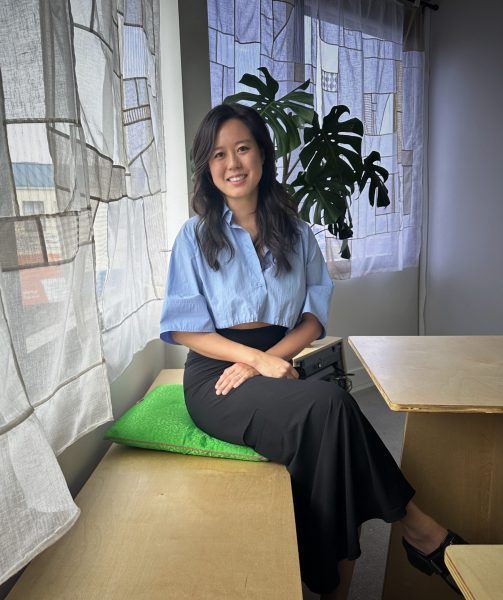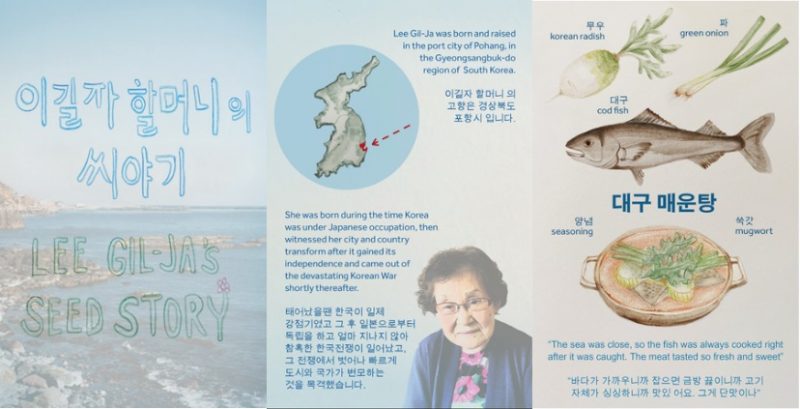[Next Gen Leader: Yoon Ju Ellie Lee – GYOPO]
In a mosaic of global identities, should they be called Koreans, second-generation Korean Americans, or Gyopo? Although their identity cannot be simply described with just one word, the term Gyopo certainly carries profound but sometimes nuanced layers of meanings, especially among the others.
Gyopo (교포) in Korean means “nationals”, especially referring to people who live outside of their home country, for example, Korean Americans who moved or were born here and have Korean roots but do not live in Korea.
In Los Angeles Koreatown, GYOPO is also the name of a non-profit organization, and it is a “collective of diasporic Korean cultural producers and arts professionals.”
Yoon Ju Ellie Lee is a member of the steering committee at GYOPO, one of those who strives to create a platform that bridges Korean heritage with contemporary cultural dialogue. GYOPO is dedicated to exploring and celebrating the complexities of Korean identity for those navigating the intersections of culture, history, and personal experience.

“GYOPO always feels like a reunion,” Lee shares with a warm smile, capturing the essence of the organization’s mission. The term ‘Gyopo’ itself is laden with emotional and cultural significance. For Lee, it evokes a sense of coming together, a relief mingled with longing. It’s about reconnecting with familiar faces and forming new bonds, akin to the joyous embrace of a long-lost friend.
Lee’s journey with GYOPO began with a personal need to explore her Korean roots deeply and authentically. “Before I started doing GYOPO work, if someone said, ‘Oh, you’re Korean,’ it was easy to just talk about food and leave it at that. There’s so much more, and it felt overwhelming to go further.” This realization spurred the creation of a space where Korean Americans could delve into their heritage without the burden of preconceived notions or stereotypes.
Reflecting on its inception, Lee explains, “GYOPO began as a small gathering among friends and colleagues who shared a common struggle: how to reconcile our Korean heritage with our American upbringing.” These early discussions evolved into a collective effort to create meaningful programming that addresses the multifaceted nature of Korean identity.
Behind GYOPO’s impactful programs lies a dedicated team led by a “steering committee”. Unlike a traditional form of any other organization with a president and vice presidents, GYOPO is run by a horizontal structure of ten steering committee members, Lee explained. “Our steering committee comprises individuals passionate about Korean culture and identity. They guide our strategic initiatives and ensure our programs meet with our community’s needs.” This structure allows GYOPO to maintain its focus on cultural exploration through art while sustaining a safe space where people can share ideas freely.
The word Gyopo, however, sometimes carries meaning beyond its vocabularic meaning. In Korea, it often has a negative connotation labeling or putting them in a “box” of stereotypes as those who live in the U.S., are rich, have freedom or sometimes are spoiled, mostly of those characteristics that contrast Korean conservative beliefs. This has brought many to question Lee, ‘Why did you make it called Gyopo despite its nuance?’, then Lee answered, “We’re trying to reclaim the term Gyopo.”
“For us, GYOPO, we are trying to understand what it means to be of Korean heritage here. Being a Gyopo is a unique and extremely diverse experience. Take a look at our programming and you’ll get a taste of what Gyopo means. For those who don’t know what it means, we’re happy to educate. Non-Korean speakers learn a new word, and that’s always good.”
One of GYOPOs standout programs was a screening and symposium focused on the origins of K-pop, featuring scholars such as Michelle Cho. The discussions didn’t shy away from the darker aspects of Korea’s cultural exports, touching on historical events like the Vietnam War and the role of the U.S. military in Korea.
“It’s important to understand that Korean culture’s export isn’t just about soft power; there are complex, sometimes aggressive, power dynamics at play that have historical and socio political contexts that should be understood. The key is that we don’t just celebrate Korean culture blindly. We’re being critical because that shapes how we think and experience the world,” Lee explained.
GYOPO’s events are a vibrant tapestry of cultural exploration, intellectual engagement, and community connection. From symposiums on the golden age of Korean cinema, like the collaboration with LACMA that brought together scholars to discuss the evolution and censorship of Korean films, to an event delving into Korean shamanism and spirituality, GYOPO crafts experiences that resonate deeply with Korean diasporic communities.
Its programs also have featured diverse topics such as queer identities within the Asian diaspora and the traumatic legacy of the Jeju Massacre. Each event is meticulously designed to foster critical thinking, celebrate cultural heritage, and build bridges between past and present, tradition and modernity.
Through such programs, GYOPO encourages a critical look at cultural phenomena. Lee believes that “you can love and appreciate something and still analyze it. That’s what we don’t want to lose with mainstream enthusiasm about Korean culture.” This approach helps participants appreciate their heritage while maintaining a critical perspective on its various facets.
GYOPO also fosters intergenerational connections, notably through collaborations with collectives like Ssi Ya Gi. “We asked elders to share vivid food memories, which naturally led to discussions about the war and migration. It’s less overwhelming than directly asking about historical traumas,” Lee recounts. These narratives, often preserved in art and publications, offer a poignant, accessible entry point into complex histories.

Lee recalls an emotional moment with Lee Gil-Ja from Pohang, Korea, who was moved to tears upon seeing her story documented. “She said, ‘This is my story, and now other people can know about it’,” Lee said, highlighting the profound impact of preserving personal histories in understanding the heritage of Korean identity.
A key aspect of GYOPO’s mission is education. By addressing topics that drive beyond a Korean identity to deeper than just the people’s appearances, GYOPO expands the narrative of what it means to be Korean. “I feel more confident as a Gyopo now because I’m not putting myself in a box. I’m not stereotyping myself,” Lee asserts.
This educational aspect empowers individuals to navigate their identities with confidence and patience. Lee emphasizes that with knowledge comes the ability to challenge and dismantle stereotypes. “If I encounter someone disrespecting me and putting me in some Korean woman box they’ve invented, I’m going to be okay. I might even have more patience to help them know what they really want to know – if it seems worth the energy.”
Lee envisions GYOPO continuing to be a space of critical engagement and cultural celebration. The organization’s success lies in its ability to evolve while staying true to its core mission: fostering a deeper understanding of Korean identity beyond the surface.
In Lee’s words, “It’s a return to self.” GYOPO’s work allows individuals to embrace their unique journeys, shedding the shame of not being “Korean enough” and finding meaning on their own terms. This journey of self-discovery and cultural exploration is what makes GYOPO an indispensable part of the Korean-American experience.
Lee reflects on the impact of GYOPO’s programs on the broader community: “Our attendees often tell us, ‘I didn’t realize I needed GYOPO.’ Program participants have told us ‘I have found my audience.’ Our work is about finding community and understanding our heritage in a nuanced way.” This sentiment underscores the organization’s role in providing a space where personal stories intertwine with broader cultural narratives.
Discussing future initiatives, Lee expresses a desire to expand GYOPO’s reach: “We want to engage more with younger generations and continue our dialogue on evolving Korean identities.” This forward-looking approach ensures that GYOPO remains relevant and inclusive as demographics and cultural landscapes evolve.
Lee and GYOPO’s dedication to fostering understanding and pride in Korean heritage is palpable. “I want every GYOPO participant, volunteer, audience member to feel empowered by their identity,” she asserts. Through education, art, and dialogue, GYOPO not only celebrates Korean culture but also challenges misconceptions and builds bridges across communities.
“I think with more education and confidence, we can actually help people break down their own stereotypes of who we are as Korean people. Currently with GYOPO, I have a feeling of relief.”
“When I think of GYOPO, the word has this feeling of coming back together, like finding someone who I haven’t seen in a long time. It’s a mix between longing and relief. It’s a relief that comes from being together. GYOPO generates the feeling of letting go of shame and embracing our own unique journey into finding meaning about “Korean-ness” on our own terms. And I think that’s where this relief comes from.”
BY HOONSIK WOO [woo.hoonsik@koreadaily.com]




